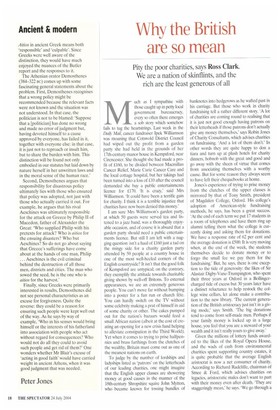Ancient & modern
Aitios in ancient Greek means both 'responsible' and 'culpable'. Since Greeks were well aware of the distinction, they would have much enjoyed the nuances of the Butler report and the responses to it.
The Athenian orator Demosthenes (384-322 BC) comes up with some fascinating general statements about the problem. First, Demosthenes recognises that a wrong policy might be recommended because the relevant facts were not known and the situation was not understood, In that case, the politician is not to be blamed: 'Suppose that a [politician] has done no wrong and made no error of judgment but, having devoted himself to a cause approved by everyone, has failed in it, together with everyone else: in that case, it is just not to reproach or insult him, but to share the burden with him. This distinction will be found not only embodied in our statutes but laid down by nature herself in her unwritten laws and in the moral sense of the human race.'
Second, Demosthenes argues that responsibility for disastrous policy ultimately lies with those who ensured that policy was adopted, not just with those who actually carried it out. For example, he argues that his rival Aeschines was ultimately responsible for the attack on Greece by Philip II of Macedon, father of Alexander the Great: 'Who supplied Philip with his pretexts for attack? Who is aitios for the ensuing disasters? Who but Aeschines? So do not go about saying that Greece's sufferings have come about at the hands of one man, Philip Aeschines is the evil criminal behind the destruction of all those men, districts and cities. The man who sowed the seed, he is the one who is aitios for the harvest.'
Finally, since Greeks were primarily interested in results, Demosthenes did not see personal characteristics as an excuse for forgiveness. Quite the reverse: they could be a reason for ensuring such people were kept well out of the way. As he says by way of example, 'Who in his senses would bring himself or the interests of his fatherland into association with people who act without regard for consequences? Who would not do all they could to avoid such people and get rid of them?' One wonders whether Mr Blair's excuse of 'acting in good faith' would have carried weight in ancient Athens, when it was good judgment that was needed.


























































 Previous page
Previous page